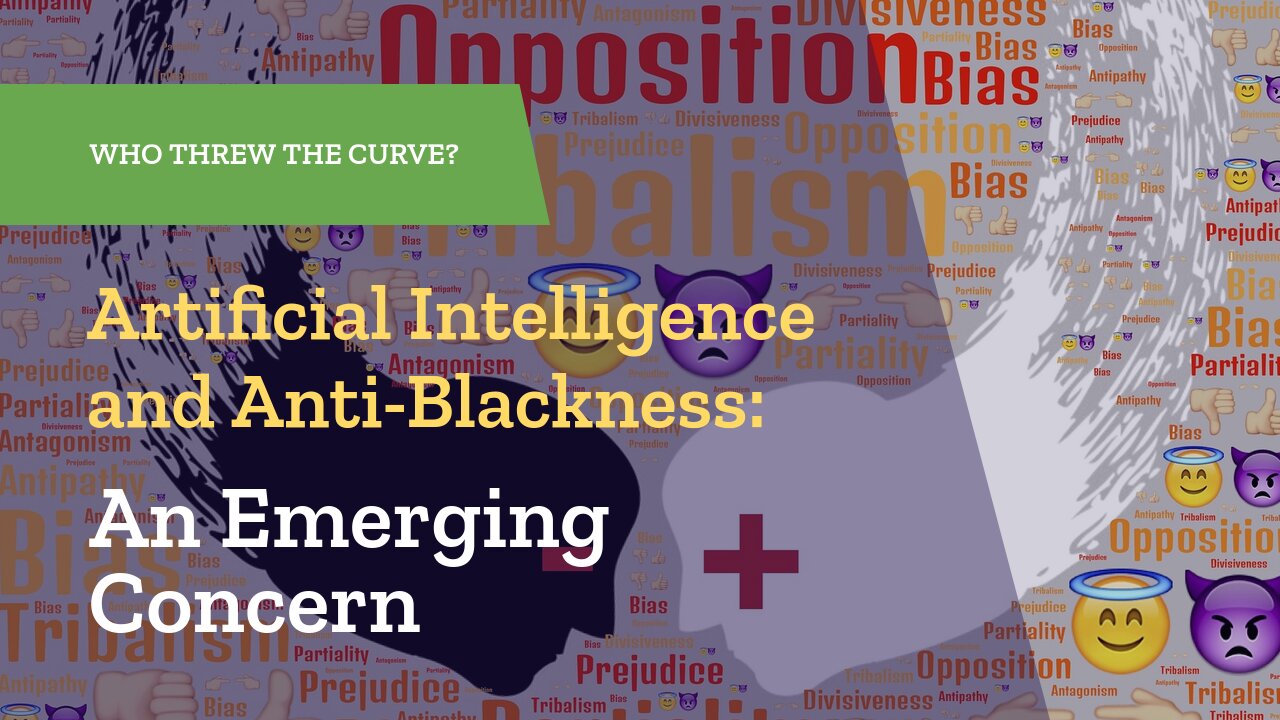Premium Only Content

Artificial Intelligence and Anti-Blackness: An Emerging Concern
Artificial Intelligence (AI) technology, a revolutionary force in the 21st century, has transformed myriad aspects of our lives, from mundane tasks to complex decision-making processes. However, its rise has also brought concerns about bias, particularly anti-Black bias, into sharp focus. The question of whether AI can become biased in the future is, in fact, a reflection of our present reality. AI systems have already shown evidence of bias, leading to detrimental effects on marginalized communities, including the Black population. Thus, this Article explores the origins, manifestations, and potential solutions of AI bias, with a particular focus on anti-Blackness.
Origins of AI Bias
To understand the origins of AI bias, it is crucial to recognize that AI systems learn from data. If the data used for training AI algorithms reflects societal biases, the AI system is likely to reproduce and amplify those biases. Historical data often contains systemic biases, including racial discrimination, which can be inadvertently embedded in AI algorithms. For example, if historical crime data disproportionately targets Black individuals due to racial profiling, predictive policing algorithms trained on this data may perpetuate biased outcomes, leading to over-policing and unjust targeting of Black communities.
Manifestation of Anti-Blackness in AI
The manifestation of anti-Black bias in AI systems can be observed across various sectors, including criminal justice, healthcare, finance, and employment. In the criminal justice system, algorithms used for risk assessment and sentencing decisions have demonstrated racial disparities, with Black individuals often receiving harsher outcomes compared to their white counterparts. In healthcare, studies have shown that AI algorithms used for determining treatment plans and predicting patient outcomes exhibit racial biases, leading to disparities in medical care. Financial institutions have also faced scrutiny for biased AI algorithms that disproportionately deny loans or charge higher interest rates to Black individuals. Additionally, hiring algorithms have been found to disadvantage Black applicants, perpetuating discriminatory practices.
Understanding the consequences of anti-Black bias in AI is essential, as it perpetuates systemic inequalities and amplifies existing racial disparities. The use of biased AI systems can lead to discrimination, exclusion, and the violation of the rights and dignity of Black individuals, undermining social progress and perpetuating historical injustices.
Potential Solutions to AI Bias
Addressing AI bias requires multi-pronged approaches, including diversifying AI teams, implementing stringent bias audits, and enacting regulations to hold AI systems accountable. Moreover, there is a need for continual education and research on AI ethics, which should include the lived experiences and perspectives of the Black community.
Conclusion
As we continue to integrate AI into our societal fabric, it is crucial to confront its potential for bias against Black individuals and other marginalized communities. Addressing AI bias is not just a technical challenge but also a social and ethical imperative. By acknowledging and actively working against these biases, we can work towards an AI-driven future that is fair, equitable, and inclusive.
-
 UPCOMING
UPCOMING
Mally_Mouse
44 minutes agoLet's Yap About It - LIVE!
18 -
 LIVE
LIVE
ZWOGs
2 hours ago🔴LIVE IN 1440p! - Learning Heroes in Marvel Rivals, Helldivers 2, Then what? - Come Hang Out!
274 watching -
 16:38
16:38
SLS - Street League Skateboarding
7 days agoRayssa Leal's Most Clutch SLS Wins Ever! 🥶🏆
2.36K -
 1:53:02
1:53:02
Russell Brand
3 hours agoRFK Confirmation Battle – The Deep State is Losing Control! – SF528
105K101 -
 LIVE
LIVE
The Charlie Kirk Show
2 hours agoThe RFK Confirmation Hearing + Dr. Phil On A Raid | Dr. Phil, Mansdoerfer | 1.29.2025
9,591 watching -
 4:41:31
4:41:31
Right Side Broadcasting Network
23 hours agoLIVE REPLAY: RFK Jr. Testifies at Senate Confirmation Hearing for HHS Secretary - 1/29/25
234K281 -
 28:22
28:22
Stephen Gardner
2 hours ago🔥Sen. Lindsay Graham BETRAYS TRUMP, calls for investigation!
22.8K43 -
 1:00:33
1:00:33
The Dan Bongino Show
5 hours agoTruth Returns To The White House Press Room (Ep. 2411) - 01/29/2025
604K1.17K -
 1:01:33
1:01:33
Grant Stinchfield
2 hours ago $3.44 earnedVague Details: An Effort to Avoid Panic Over Drones & "The Research"
39.3K9 -
 LIVE
LIVE
Barry Cunningham
15 hours agoWATCH LIVE: RFK JR. CONFIRMATION HEARING! ROBERT F KENNEDY JR TESTIFIES BEFORE SENATE
1,859 watching